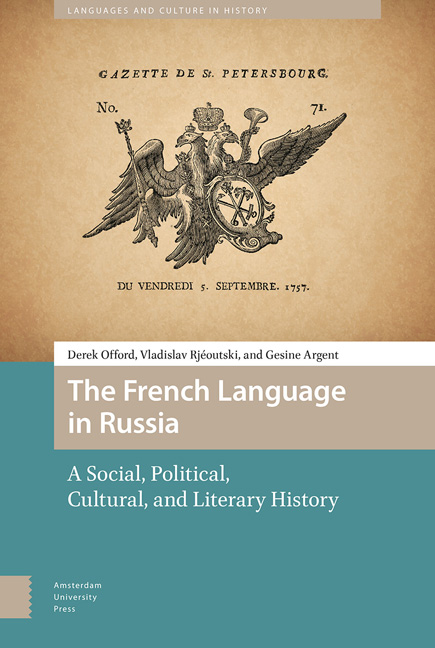Book contents
- Frontmatter
- Contents
- List of illustrations
- Preface
- Acknowledgements
- Presentation of Dates, Transliteration, and other Editorial Practices
- The Romanovs
- Introduction
- Chapter 1 The historical contexts of Russian francophonie
- Chapter 2 Teaching and learning French
- Chapter 3 French at court
- Chapter 4 French in high society
- Chapter 5 French in diplomacy and other official domains
- Chapter 6 Writing French
- Chapter 7 French for cultural propaganda and political polemics
- Chapter 8 Language attitudes
- Chapter 9 Perceptions of bilingualism in the classical Russian novel
- Conclusion The functions of French in imperial Russia
- Bibliography
- Index
- Languages and Culture in History
Chapter 9 - Perceptions of bilingualism in the classical Russian novel
Published online by Cambridge University Press: 16 February 2021
- Frontmatter
- Contents
- List of illustrations
- Preface
- Acknowledgements
- Presentation of Dates, Transliteration, and other Editorial Practices
- The Romanovs
- Introduction
- Chapter 1 The historical contexts of Russian francophonie
- Chapter 2 Teaching and learning French
- Chapter 3 French at court
- Chapter 4 French in high society
- Chapter 5 French in diplomacy and other official domains
- Chapter 6 Writing French
- Chapter 7 French for cultural propaganda and political polemics
- Chapter 8 Language attitudes
- Chapter 9 Perceptions of bilingualism in the classical Russian novel
- Conclusion The functions of French in imperial Russia
- Bibliography
- Index
- Languages and Culture in History
Summary
The rise of the novel and the expression of nationhood in it
By the age of Alexander II, Russian prose writers – inspired by the example that Pushkin and others had set in the 1830s – had fully developed their own idiom. They, no less than Pushkin and other early nineteenth-century poets of the so-called Pushkin Pleiad, were responsible for the creation of a literature written in the vernacular which became the outstanding manifestation of Russia's cultural maturity and the clearest expression of the new Russian nationhood. It was important to prose writers, as they strove for cultural autonomy, to free themselves from subservience to foreign literary models. It also helped them, as they tried to define their own nation and its mission, to look critically at another sign of Russians’ apparent subservience to foreign cultural mentors, namely the persistence of the phenomenon of French-speaking in nineteenth-century noble society. It is the continuation of debate about the semiotic significance and the effects of noble francophonie in the writings of Ivan Turgenev, Tolstoi, and Dostoevskii that we examine in this final chapter.
To point out the shortcomings of prose fiction as a source of information on actual linguistic practice, as we did in our introduction to this volume, is not to deny that fiction may corroborate the evidence provided by nonliterary types of written source. The classical Russian novel is firmly rooted in byt (daily life), of which language practice was of course one element. This practice included bilingualism, code-switching, and choice of French rather than Russian to tackle certain subjects, to negotiate certain relationships and situations, or to indicate social identity. At the same time, the social or civic colouring of a work of fiction, which – as the literary historian D.S. Mirsky remarked – was ‘a general characteristic of the European novel of the mid nineteenth century, but [was] nowhere more apparent than in Russia’, made for a high degree of subjectivity in treatment of Franco-Russian bilingualism, as in other matters. For example, authors might have their literary characters make linguistic choices or use language in particular ways in order to highlight personal traits or moral qualities which they wished their readers to find appealing or rebarbative and thus to underline some broader social or cultural point.
- Type
- Chapter
- Information
- The French Language in RussiaA Social, Political, Cultural, and Literary History, pp. 519 - 570Publisher: Amsterdam University PressPrint publication year: 2018



